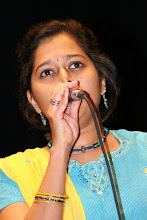Write up by Murali Venkatraman
“Have you read all these books ?!”
My mother exclaimed innocently looking at the many cartons of books I have ranging from highly technical ones which ran for thousand pages or more to ones which were pocket-sized that captured popular science in an interesting way. I was stunned for a moment since I did not know how to answer. I took a look at my big collection and responded:
“No amma. I hope I will read them some day”
She got busy with kitchen work and had forgotten the conversation. For her it was just a curiosity as to how much her son could study.
But the question reverberated in my mind. Why do I have so many books some of which I may never be reading ? For example, I have books on mathematical logic,topology etc but given my time constraints, I wonder if I will ever get to read them. It led me to an important decision – “No more books until absolutely necessary”. My mother’s simple innocence-laden question pushed me to rethink about my attitude towards buying books.
While talking about the life of the poet-philosopher-composer Sadashiva Brahmendra one cannot but admire how a simple instruction from his mother-in-law transformed his life from one of a possible ordinary family man into someone who moved freely like a gypsy and composed beautiful songs with deep philosophical thought. It may be a folklore, that his mother-in-law’s words “Don’t come inside the house” on the night of his marriage consummation, made him rethink about his real pursuits in life.
However, consider another related question : “What is the purpose of life if there is one at all ?”. This seemingly simple question has been addressed for centuries and people are still trying to find an answer. With brahmendra, the simple instruction/question did have a deep impact on the man who finally came to the public domain and we were blessed with an exceptional poet. Thus seemingly simple innocent questions/instructions may bring about some dramatic irreversible transformations.
Read more about Sadasiva Brahmendra here :
To quote my mentor Dr. Bosco Emmanuel:
“Pioneers of science always asked and addressed simple questions. How did D. J. Thouless arrive at the branching in the theory of percolation ? He just asked a simple question. What will be the conductivity of carbon if I randomly punched a few holes in it ? He took a carbon sheet and punched a few random holes in it, measured the conductivity and plotted a graph of the conductivity versus available area. He finally ended up being an exponent in percolation theory "
In this beautiful song which is set in the ragam shyama, which is a cousin of shuddha saaveri and aarabhi, Sadashiva expounds beautiful descriptions of a divine being (krishna) when he himself is in a state of trance. He instructs the mind to roam in the field of universal consciousness (the Brahman) aided sweetly by the music.
In the movie, this comes as a lullaby that the sishya sings for the guru. The director K. Vishwanath had tastefully used a break in the song in the guise of sishya forgetting the lyrics. This invariably invites the voice of guru (SPB) and an uninfringing melody which gently rocks the listener is born. In our version, I have expanded the song a little more to allow more room for the male singer to savor.
Lyrics:
====
maanasa sanchararE
brahmaNi maanasa sanchararE
madasikhi pinchaalankruta chikurE
mahaneeya kapOlajita mukurE
shri ramaNeekucha durga vihaari
sEvakajana mandira mandaarE
paramahamsamukha chandra chakOrE
pari poorita muraLeeravadhaarE
(courtesy : http://www.telugulyrics.net/Sankarabharanam-Movie-Lyrics/Manasa-Sancharare-Song-Lyrics/)
Meaning:
==
Oh, Mind ! Undertake your pilgrimage in the Brahmam !
The locks of Brahman, is adorned with the plumes of an exhilarated peacock (mada sikhi)! The cheeks of the Supreme One outwit the brightness of a mirror !
He sports around in the fort of the breast-hillocks of Mahalakshmi (Sri). For his devotees, He is a Kalpavriksha in the court yard (mandira Mandaare) Supreme ascetics (paramahamsa) delight in that face-moon (mukha chandraa) as a partridge bird (chakore – with obvious reference to the chakora bird that thirsts for moonlight) Oh, Mind! May your pilgrimage be complete in this Brahman that fills everything with the flow of the music from His flute(murali) ! !
(courtesy:http://www.ecse.rpi.edu/homepages/shivkuma/music/manasasancharare.htm )
Credits:
Song : Maanasa Sancharare
Composer / Lyricist : Sadashiva Brahmendra
Originally sung by : Vani Jeyaram, S. P. Balasubramaniyam
Orignally Arranged By : K. V. Mahadevan
Movie : shankaraBharaNam
Singers: Meera Manohar, Murali Venkatraman
Karaoke/ Arrangement : Murali Venkatraman
Mixing : Meera Manohar
Celebrating Shankarabharanam - 2 - Maanasa Sancharare with Murali Venkatraman- REUPLOADED | Upload Music





